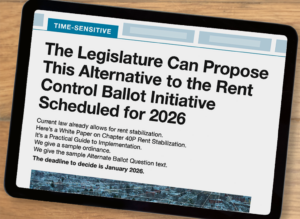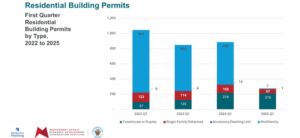2026 Ballot Initiative Explained
|
|
|
|
Chapter 40P. Limiting Rent Increases Be it enacted by the People, and by their authority: The General Laws are hereby amended by striking out chapter 40P and inserting in place thereof the following chapter – |
The ballot initiative conveniently leaves out what MGL Chapter 40P is. “The Massachusetts Rent Control Prohibition Act,” allows for rent control already, as long as it is voluntary and the city or town enacting it pays the landlord the difference between market rate and the controlled rent. In other words, this ballot initiative takes away our right to compensation under the law. We could have rent control now, but advocates don’t want to pay for it (probably because they know it doesn’t work). They want you to pay for it. And they’re making sure when you go to the voting booth, you don’t know what Chapter 40P says – on purpose. |
|
CHAPTER 40P. LIMITING RENT INCREASES |
Chapter 40P gets deleted and re-titled. This is not an edit. This is a complete replacement. |
|
Section 1. Purpose. The purpose of this act is to provide housing stability for tenants, landlords, and communities across the commonwealth, |
Rent control doesn’t provide housing stability, for landlords, or anyone else. It causes buildings to fall into disrepair, making less housing available. |
|
and curb displacement as a result of the housing shortage and affordability crisis in Massachusetts. |
This says displacement will stop, because there will be more housing available at prices people can afford. But rent control decreases availability …unless the developers can come in and create more housing. And this bill is designed to benefit developers, not small property owners. Keep reading. |
|
Section 2. Definitions. For the purposes of this chapter – “Covered Dwelling Units” shall mean all dwelling units leased for residential, but not commercial, use, except: |
All housing units that are for residential purposes are subject to rent control, with the following exceptions: |
|
If you live in your multi-family home, and there are four units or fewer (so three rented out), your building is rent control exempt. We’re not sure what happens if you live in the building, but the building is owned by an LLC in your name. Possibly you would not be able to get the owner-occupy exemption. |
|
This is less clear. These units are exempt from rent control. What does “subject to regulation by public authority” mean, exactly? Public housing projects? Section 8 and MRVP houses are the obvious choices, but… |
|
Section 8 and MRVP are mobile vouchers. Those rents are always determined by market rate, so…now they have to be determined by rent control? Considering how much regulation goes into having a unit that is Section 8/MRVP-compliant, there’s no way these aren’t regulated by a public authority. The people who wrote this ballot initiative think their short CPI or 5% increase (more on that later) is adequate to capture the nuance of regional market variations. Incredible. |
|
AIR BnBs and hotels are exempt from rent control, we guess. Unless you want to stay for longer than 2 weeks, in which case, your landlord will have to do… something. The ballot isn’t clear what. |
|
Boarding schools, church housing and non-profit housing are also exempt. This is a pretty major loophole. “Non-profit” doesn’t mean “non-salary.” You might be able to convert your rental to a non-profit entity, avoid rent control, and exempt yourself from real estate tax. |
|
Here’s where developers benefit, and it’s a big deal. If the first residential certificate of occupancy is less than 10 years old, you get 10 years from when it was issued where you are exempt from rent control. If you tear down a falling-down triple-decker (likely in disrepair because the landlord can’t afford to fix anything under rent control), that house no longer exists. Entirely new construction requires entirely new permits and entirely new certificates of occupancy. Your average small landlord can’t afford to tear down and rebuild their triple-decker. Not with the cost of new construction. It’s far more likely a developer is going to swoop in, buy the property (at a devalued rate, since rents are so low), raze it to the ground and build something bigger and newer? Well, that’s going to be mighty expensive! Good things such buildings will be exempt for a whole decade and they can charge whatever they want in the meantime (and they will). Remind us, how does this help people who can’t afford housing? |
|
Section 3. Rent increase limits. |
The section t |
|
This chapter shall establish a limit on any annual rent increase for a covered dwelling unit in the commonwealth, which shall not exceed the annual increase in Consumer Price Index or 5%, whichever is lower, in any 12-month period. |
Your rent increase every year is limited to 5% over your base rent, or the amount of inflation as determined by the Consumer Price Index – whichever is less. This initiative does not tell us which Consumer Price Index the state should use to determine this (there are several). Post-Covid, there have been years where CPI was above 5%. What does that mean? You won’t be able to keep pace with inflation. If this structure had been the case through the 1970s and 80s, today’s rents would be half their current value, but costs would be the same. We’d have hundreds of thousands of crumbling buildings, and municipal budgets would be crushed. |
|
This limit shall apply whether or not there is a change in tenancy during the relevant 12-month period. |
Even if someone moves out or is evicted, you cannot re-adjust the rent for the next tenant. Whatever your base rent is, you’re stuck. |
|
For purposes of this chapter, the rent amount in place on January 31, 2026, shall serve as the base rent upon which any annual rent increase shall be applied. |
Whatever your rent was on Jan. 31, 2026 – almost a full year before this is even going to be on the ballot – is what your “base rent” will be for eternity. Repair costs, maintenance and taxes are all a part of doing business, but under rent control, these costs will keep increasing, and your rents will stay low. |
|
If a covered dwelling unit is vacant on the date of adoption, the last rent amount charged shall serve as the base rent. |
If rent control passes and your unit is empty at that point, your base rent is whatever the rent was last. Depending on what you were charging then, that could be fine, or it could be a big problem. And if you buy an occupied building, you’re bound to those lease terms, but you didn’t set the rent. You’re stuck. Small landlords will sell out because they can’t continue to keep their properties under rent control. Other small landlords won’t be able to assume the risk. But big developers will be able to absorb those properties easily. |
|
If there was no previous rent amount, or if no rent has been charged for at least the previous five years, for a covered dwelling unit the rent amount the first owner charges following the date of adoption shall serve as the base rent. |
If you never charged rent, or it’s been five years, you can start renting your unit out at whatever you want. Right now, a multi-family home that hasn’t been rented in four years because of its state of disrepair is an investment opportunity for someone else. You’d fix it up and recoup your money by charging market rent. Under rent control, you won’t be able to afford the renovations because you can only charge whatever the prior landlord was getting for their (crappy) rental. You’d be stuck. That means buildings that might be rentable with a little TLC will probably sit vacant until a developer comes and bulldozes them. |
|
Where dwelling units are exempt, a notice of exemption must be provided with the lease for all tenancies. If there is no written lease for such dwelling units, the tenants-at-will must be provided with a written notice of exemption prior to the acceptance of the initial rent payment. |
New leases and new tenancies at will require you to tell the tenants in writing that your building is not subject to rent control. Your tenants will already know, though. Rent controlled apartments will never come up for rent, the supply will drop, and all that will be left are non-controlled units. It will be slim pickings, at a high price. |
|
Section 4. Penalties. Any violation of this chapter shall be deemed an unfair and deceptive act under chapter 93A of the General Laws. Any person claiming a violation of this chapter may pursue remedies under section 9 of chapter 93A. |
If you mess any of this up, you will be liable under 93A, which means triple damages and attorney’s fees. We’re guessing this includes if you forget to tell your renters that your building is not rent-controlled. |
|
The attorney general is hereby authorized to bring an action under section 4 of chapter 93A to enforce this provision and to obtain restitution, civil penalties, injunctive relief, and any other relief awarded pursuant to said chapter 93A. |
The attorney general is able to charge non-compliant landlords under 93A. It doesn’t say who else can. It also doesn’t give the attorney general any power to create regulations surrounding rent control – you’re stuck at 5% or CPI until the world ends or (let’s be honest) you sell out and a developer comes in, bulldozes your duplex and builds 20 units of luxury apartments at double or triple your old rent. |
|
Section 5. Interpretation of this Chapter. Nothing in this section shall be construed to interfere with any existing rights or protections afforded to tenants under current state or federal law. |
But the existing rights of landlords – namely the constitutional right to compensation for public use of private property – aren’t worth the paper this ballot initiative will be printed on.
|






